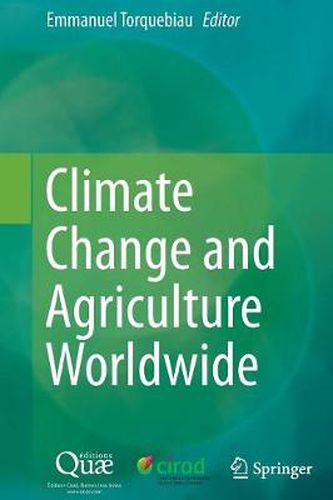Readings Newsletter
Become a Readings Member to make your shopping experience even easier.
Sign in or sign up for free!
You’re not far away from qualifying for FREE standard shipping within Australia
You’ve qualified for FREE standard shipping within Australia
The cart is loading…






This title is printed to order. This book may have been self-published. If so, we cannot guarantee the quality of the content. In the main most books will have gone through the editing process however some may not. We therefore suggest that you be aware of this before ordering this book. If in doubt check either the author or publisher’s details as we are unable to accept any returns unless they are faulty. Please contact us if you have any questions.
In recent years, especially with the approach of the 21st Session of the Conference of the Parties to the United Nations Framework Convention on Climate Change in Paris in late 2015, the number of publications, conferences and meetings on climate change has been growing exponentially. Yet uncertainties remain concerning rural tropical areas where models are forecasting the onset of multiple disorders and trends are unclear. Meanwhile, the impact of climate change on the poorest communities is regularly documented, often prompting alarmist reactions.
How can food security be achieved while adapting to and mitigating climate change? What are the main threats to agriculture in developing countries? How do farmers in these countries cope with the threats? What does agricultural research propose? What options have yet to be investigated?
A broad scope of scientific research is underway to address these challenges. Diverse solutions are available, including new agricultural practices, water management, agricultural waste recycling, diagnosis of emerging diseases, payment for ecosystem services, etc. Gaining insight into the financial and political mechanisms that underlie international climate negotiations is also essential to design practical ways to deal with climate issues and meet sustainable development requirements in collaboration with farmers. This book pools the wealth of experience of dozens of researchers and
development officers from a range of disciplines. We have focused on making it detailed, accurate and hopefully easy to read for researchers, students and all other informed readers.
$9.00 standard shipping within Australia
FREE standard shipping within Australia for orders over $100.00
Express & International shipping calculated at checkout
This title is printed to order. This book may have been self-published. If so, we cannot guarantee the quality of the content. In the main most books will have gone through the editing process however some may not. We therefore suggest that you be aware of this before ordering this book. If in doubt check either the author or publisher’s details as we are unable to accept any returns unless they are faulty. Please contact us if you have any questions.
In recent years, especially with the approach of the 21st Session of the Conference of the Parties to the United Nations Framework Convention on Climate Change in Paris in late 2015, the number of publications, conferences and meetings on climate change has been growing exponentially. Yet uncertainties remain concerning rural tropical areas where models are forecasting the onset of multiple disorders and trends are unclear. Meanwhile, the impact of climate change on the poorest communities is regularly documented, often prompting alarmist reactions.
How can food security be achieved while adapting to and mitigating climate change? What are the main threats to agriculture in developing countries? How do farmers in these countries cope with the threats? What does agricultural research propose? What options have yet to be investigated?
A broad scope of scientific research is underway to address these challenges. Diverse solutions are available, including new agricultural practices, water management, agricultural waste recycling, diagnosis of emerging diseases, payment for ecosystem services, etc. Gaining insight into the financial and political mechanisms that underlie international climate negotiations is also essential to design practical ways to deal with climate issues and meet sustainable development requirements in collaboration with farmers. This book pools the wealth of experience of dozens of researchers and
development officers from a range of disciplines. We have focused on making it detailed, accurate and hopefully easy to read for researchers, students and all other informed readers.